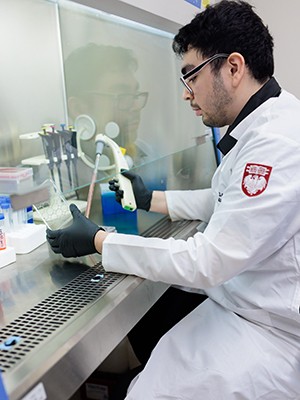Emanuel Garza was 7 years old when his mom was diagnosed with an aggressive form of cancer.
The prognosis was dismal, and Garza was terrified.
"I was immensely scared because we were poor, and my dad was out of the picture," he said. “That experience deeply impacted me.”
Fortunately, the cancer was detected early and his mom would survive. But too many people still succumb to the disease. At the University of Chicago Pritzker School of Molecular Engineering (UChicago PME), Garza is researching how to prevent cancer from taking such a toll on the general population.
Garza is entering his third year pursuing a PhD in Development, Regeneration, and Stem Cell Biology. He is currently researching the cellular origin of small cell lung cancer (SCLC) in the Joyce Chen Lab.

Lung cancer is the second most common form of cancer in the United States, as well as the deadliest, according to the American Cancer Society (ACS). The ACS estimates that about 15% of all lung cancers are SCLC.
SCLC is known to be fast-growing, and it has long been thought of as a single disease; however, in 2021, researchers discovered it could be divided into four subcategories: SCLC-ASCL1, SCLC-NEUROD1, SCLC-POU2F3, and SCLC-I. To date, the cellular origin is known for one of those four subcategories.
"The cellular origin of SCLC is important since research has shown that cancer pathology can differ depending on the cell of origin," Garza said. "Therefore, treatment can also change depending on the origin."
Garza was drawn to researching SCLC because of how dynamic — and potentially impactful — the work is.
"These SCLC cells can change from the A to N subtype depending on different mutations being acquired," Garza said. "Many things are happening everywhere all at once, making it a very interesting field to submerge myself into. I love it because it feels like I am contributing knowledge that can be used to help patients."
Garza understands why it is easy for the general public to think there hasn't been much progress when it comes to cancer treatments. There hasn't been a change in therapeutic strategies for SCLC in decades, he said.